Welcome to the 14th edition of Ground Effect from Ravensdown
With Mike Manning, Ravensdown General Manager Innovation and Strategy
It’s a privilege to write the preface to Ground Effect which continues its focus on the science and stories behind smarter farming. At a time when greenhouse gas emissions, water quality and sustainable production are rightly front and centre, this 14th edition highlights farmer examples, thought leader perspectives and innovative solutions.
Dominating attention at the moment is the He Waka Eke Noa (HWEN) collaborative effort on accounting for and reducing agricultural GHG emissions. At the time of writing, farmers were being introduced to the options and it's fair to say that each comes with its own set of challenges.
We hear from the programme director of HWEN, Beef + Lamb NZ as well as DairyNZ about the seriousness of the issue and the scale of opportunity to demonstrate leadership in managing the sector’s impact on climate. Warren Parker, chairman of the Forestry Ministerial Advisory Group outlines the potential for carbon sequestration and offsetting by native and exotic species.
Policy aside, there are real solutions being worked on such as EcoPond, a new system that virtually eliminates all methane from dairy effluent ponds. Read more about the newest ‘tool in the methane box’ developed by Lincoln University scientists and Ravensdown. Phil Journeaux also covers some exciting progress in genetics such as low-methane emitting rams and bulls.
While there are plenty of medium-and long-term technologies being worked on to mitigate methane, the EcoPond solution is based on robust science and is capable of being installed in the near term. As an aside, it was a real pleasure to see Professors Keith Cameron and Hong Di awarded the highest annual science honour in New Zealand – the Royal Society’s Pickering Medal – for their work on ClearTech.
Senior Agri Manager James Livingston discusses how potash super can propel clover yields, while Agri Manager Andrée Callaghan outlines the importance of avoiding any molybdenum-deficiency handbrake on clover growth.
Dr Ants Roberts discusses the importance of soil biology and the dangers of misinformation in that area. As rural communities face the strain of multiple challenges, Craig ‘Wiggy’ Wiggins shares his approach to mental health and wellbeing.
We hear from two farmers in very different parts of the world but both building a farming legacy with their young families. The Germanns in Southland are an integral part of a local community catchment initiative, while the Steeghs in Taupō focus on a ‘pasture first’ and ‘keep it simple’ mentality – to great effect.
Ravensdown has helped both families with Whole Farm Soil Testing to target variability in paddock fertility as well as reducing their nitrogen use.
Having been involved with setting up the first Massey University short courses on nutrient management two decades ago, it’s incredibly satisfying to see their new curriculum on farm environment planning. You can read about that and how our customer-facing team is benefitting.
All in all, anyone interested in smarter farming will be spoilt for choice in this edition. If you are interested in any of the stories or insights in this publication or if you think Ravensdown can help you in any way, I know the team would welcome your call.
Download your copy of Ground Effect

Keeping greenhouse gas management in our hands
He Waka Eke Noa was set up when the sector organisations pitched that Government, Māori and the sector bodies, on behalf of farmers and growers, work together to develop a plan to manage and reduce on-farm greenhouse gas (GHG) emissions.

Calculator helping red meat farmers understand farm emissions profile
Beef + Lamb New Zealand’s Greenhouse Gas (GHG) Calculator is one of the tools that has been developed to help farmers meet the sector’s commitment to reducing GHG emissions.

Dairy farmers cracking on with GHG goals
Dairy farmers are making great progress in knowing their numbers – a key first step in reducing on-farm emissions.
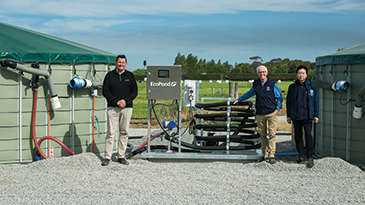
New EcoPond tool a game changer for methane emissions
Dairy farmers have a new tool to reduce methane emissions with Ravensdown’s EcoPond technology cutting up to 5% of their farm's total methane emissions.

Farming for the future in the deep south
Ravensdown visited shareholders Jolene and Hadleigh Germann’s property near Ōtautau to get the low-down on how they have reduced environmental impacts on farm and their involvement in a large-scale catchment group.

Preserving profits a balancing act
Intentionally reducing the amount of feed eaten might feel counter-intuitive to most farmers aiming to preserve or grow their farm’s profitability.
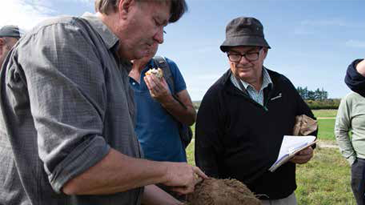
Massey University short courses deliver wins
With the increased requirement for robust, professional advice around nutrient management and environmental protection on-farm, Ravensdown has made a commitment to upskilling staff in Farm Environment Plan (FEP) guidance via Massey University’s short course offerings.

Forestry offers balancing solution to livestock emissions
Forestry, pastoral livestock farming and their supply chains are complements.

Super with nitrogen a proven performer
Superphosphate should be a firm favourite for farmers searching for greater flexibility from their annual fertiliser programme.

Is Molybdenum deficiency holding your clover back?
With the current price pressure on fertiliser N and the N-190 restrictions now in play, it’s time to ensure your clover growth is not limited by molybdenum deficiency.

Coming to a sale yard near you
Horses and farming have been anchors in Craig Wiggins’ life from a very early age, growing up on a family farm near the central North Island town of Raetihi.

First principles: the passion behind the pasture
Brett and Ruth Steeghs are building a 100-year company while raising a young family on their Central Plateau dairy farm. They share their passion and ‘pasture first’ insights with Ravensdown.

Optimising management of farmed soils
Most holistic soil scientists understand that in terms of its substance and function, soil is a complex interaction of physical, biological and chemical properties and processes interacting with climate and human management.
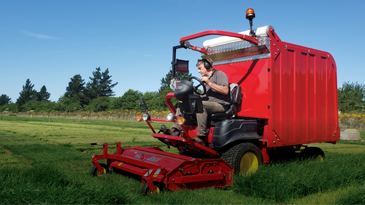
Intense selection sifts out best varieties
Terms like ‘high performance liquid chromatography, PCR testing and monoclonal anti-body immunoblot assays’ are not normally associated with the breeding of forage grasses and crops.

New tool to measure soil mineralisable nitrogen
The Potential Mineralisable Nitrogen (PMN) test and N mineralisation calculator are new tools to help farmers to reduce nitrogen (N) losses, save on fertiliser costs and maintain productivity.
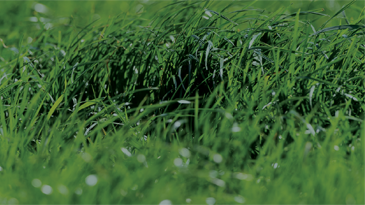
A formidable combo: Liquid N and gibberellic acid
When the timing is right, combining GA with your N fertiliser application is a smart way to improve the efficiency of nitrogen applications and stimulate pasture growth.
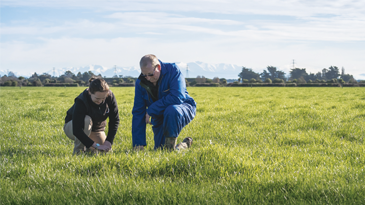
Early spring feed gap overcome
Combining Gibberellic Acid (GA) with liquid nitrogen (Flowfert N) helps bridge the feed gap in early spring for the Lincoln University Dairy Farm (LUDF) herd in Canterbury.

Elementary essentials #5: Magnesium (Mg)
The alkaline earth metal, magnesium (Mg) is the 12th element in the periodic table and is one of the 19 elements essential for life in all higher plants and animals on Earth.
